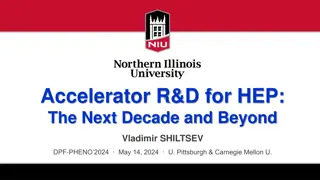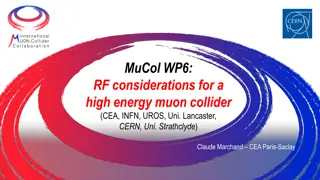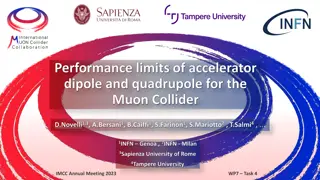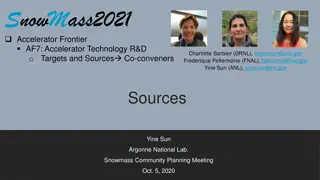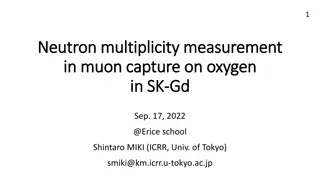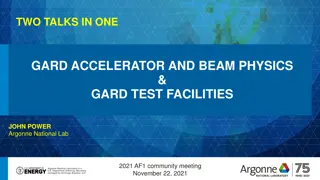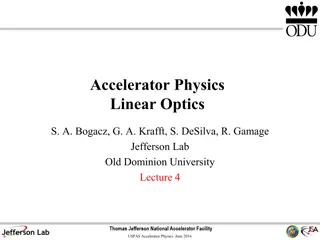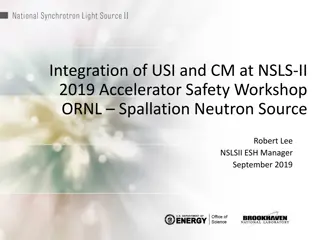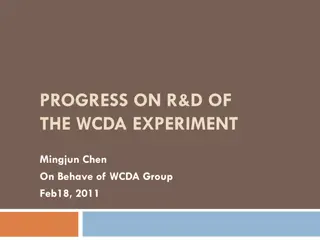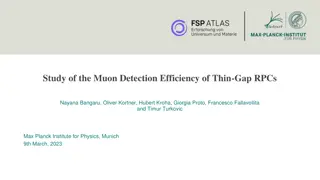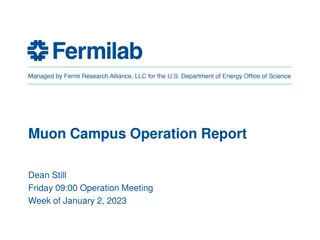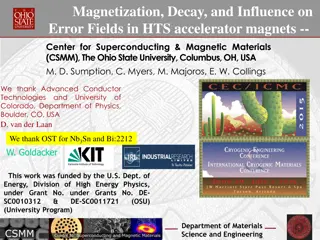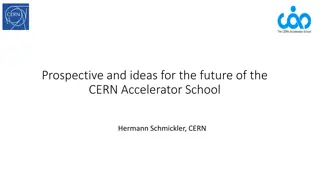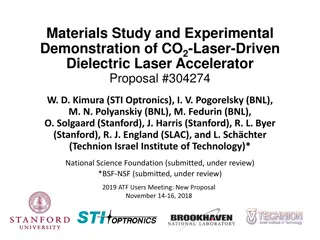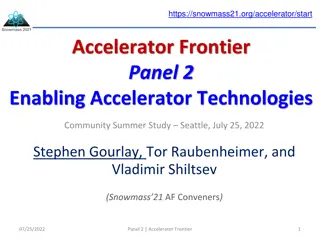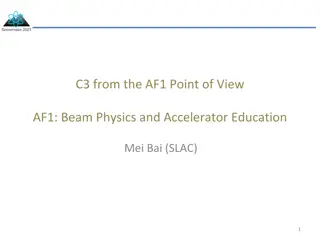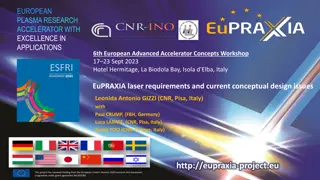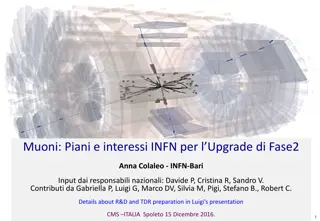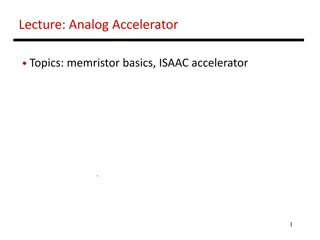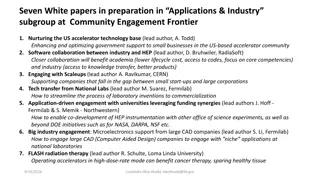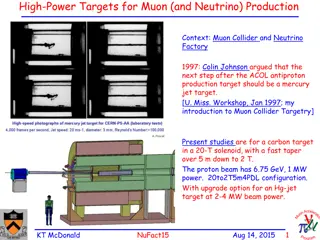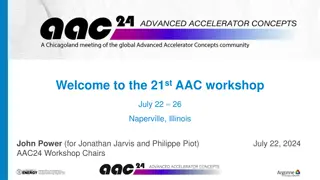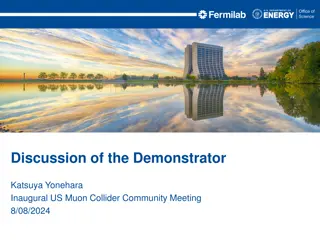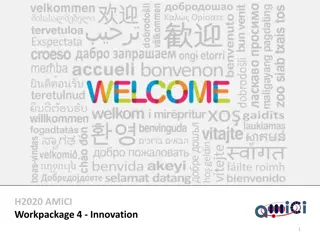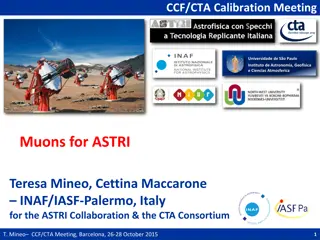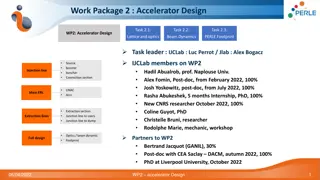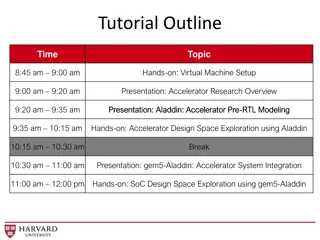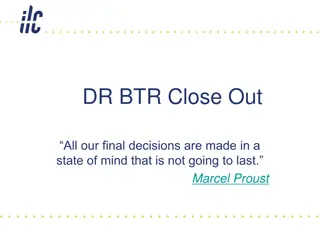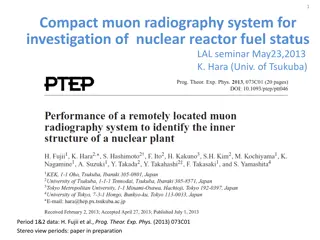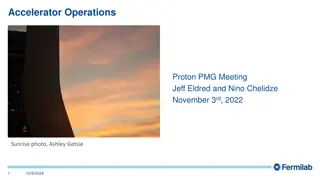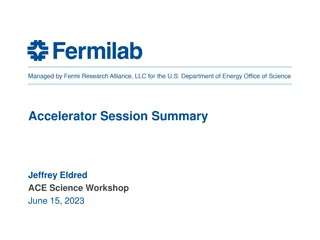Current Trends in High Energy Accelerator Developments
Explore the latest trends in high energy accelerator development as discussed by experts from various institutes around the world, including proposals from China and existing accelerator projects. Learn about the classification of accelerator facilities based on size and the ongoing evolution of fut
0 views • 36 slides
European Particle Physics Strategy Update & Accelerator R&D Overview
European Particle Physics Strategy updates serve as the cornerstone for long-term decision-making in the field, with a focus on Accelerator R&D for High Energy Physics. The update process involves key questions, R&D strategies for RF technologies, and implementation plans. Approved strategies emphas
7 views • 25 slides
Accelerator R&D for High-Energy Physics: Advancements and Future Prospects
Vladimir Shiltsev's presentation at DPF-PHENO 2024 discusses the evolution of accelerator R&D in high-energy physics, emphasizing the need for off-shore Higgs factories and targeted collider developments. The P5 recommendations underscore the importance of engaging in feasibility studies for advance
0 views • 28 slides
RF Considerations for High-Energy Muon Collider
This work package focuses on assessing feasibility issues and technological challenges of RF systems for a high-energy muon collider. Tasks include defining RF systems for acceleration and cooling complexes, addressing high gradients, beam loading, breakdown mitigation, and optimizing cavity distrib
0 views • 11 slides
Performance Limits of Accelerator Dipole and Quadrupole for Muon Collider
Utilizing Python code, the study analyzes the limits of accelerator dipole and quadrupole for the Muon Collider. Analytic formulas are implemented to assess the behavior of these components based on critical current density, operating temperatures, and superconductor materials. The study explores li
0 views • 17 slides
Government Contractors Basics for Beginners with OK APEX Accelerator
Explore the essentials of government contracting for beginners, including details about OK APEX Accelerator (formerly PTAC), the services offered, NAICS codes, SAM registration, and more. Learn how APEX Accelerator assists businesses in participating in government contracts, offering counseling, ass
0 views • 20 slides
Accelerator Technology R&D Targets and Sources Overview
The SnowMass2021 Accelerator Frontier AF7 focuses on Accelerator Technology R&D, exploring targets and sources such as high brightness electron sources, muon sources, and high intensity ion sources. The community planning meeting discussed various Letter of Interest submissions outlining innovative
0 views • 7 slides
Neutron Multiplicity Measurement in Muon Capture on Oxygen in Super-Kamiokande
Explore the neutron multiplicity measurement in muon capture on oxygen using Super-Kamiokande, a water-Cherenkov detector located underground in Japan. Gadolinium was added to enhance neutron tagging efficiency, aiding in Supernova observation, proton decay rejection, and more. Neutron signals are t
0 views • 16 slides
Accelerator Science and Beam Physics Research Overview at US National Laboratories
US high-energy physics faces budget challenges despite the need for support to remain competitive. John Power from Argonne National Laboratory discusses the importance of funding for core research and accelerator science. The GARD program in the Department of Energy Office of High Energy Physics pro
0 views • 25 slides
Linear Beam Optics and Particle Motion in Accelerator Physics
Explore the fundamental concepts of linear beam optics and particle motion in accelerator physics, covering topics such as design trajectory, path length, phase advance, transfer matrix, and more. Understand the intricacies of designing accelerators and the mathematical representations involved in o
0 views • 78 slides
Safety Assessment and Accelerator Safety Envelope Review
Overview of the Safety Assessment Document (SAD) and Accelerator Safety Envelope (ASE) process for the 400 MeV Test Area (MTA) at Fermilab. The document details the shielding assessment, approval process by various committees, and updates made to the SAD chapters and the Accelerator Safety Envelope.
4 views • 8 slides
Integration of USI and CM at NSLS-II 2019 Accelerator Safety Workshop
This document outlines the Integration of Unreviewed Safety Issues (USI) and Configuration Management (CM) at the NSLS-II 2019 Accelerator Safety Workshop conducted at the ORNL Spallation Neutron Source. It covers the USI process, screening evaluations, training, and qualifications necessary for the
0 views • 13 slides
Progress on R&D of the WCDA Experiment
This report details the progress of the Water Cerenkov Detector Array (WCDA) experiment conducted by Mingjun Chen on behalf of the WCDA Group. It includes information on the introduction to the experiment, R&D of the Water Cerenkov Detector Unit, measurement of muon events, water quality control, pr
0 views • 47 slides
Study of Muon Detection Efficiency in Thin-Gap RPCs
Conducted at the Max Planck Institute for Physics in Munich, this study focuses on the detection efficiency of thin-gap Resistive Plate Chambers. The research explores the construction, working principles, and experimental setup of RPCs, emphasizing the need for sensitive frontend electronics for hi
0 views • 14 slides
Muon Campus Operation Report for Week of January 2, 2023
Performance, activities, machine downtime, and G-2 experiment status for the past week at the Muon Campus were assessed in the operation report. Key highlights include G-2 beam delivery, maintenance work completion, impact of RF issues on studies, machine downtime details, and the integrated perform
0 views • 6 slides
Magnetization, Decay, and Error Fields in HTS Accelerator Magnets
The research conducted at The Ohio State University focuses on understanding the magnetization, decay, and influence of error fields in high-temperature superconducting (HTS) accelerator magnets. The study explores the impact of different superconducting materials such as Nb3Sn, YBCO, and Bi:2212 on
0 views • 21 slides
Future Prospects and Evolving Ideas for the CERN Accelerator School
The CERN Accelerator School is planning upcoming schools and venues, with proposals for its evolution presented. Courses cover various topics across Member States, with a focus on advanced accelerator physics. A future HEP Collider School is also in the pipeline. Suggestions for improvement include
0 views • 16 slides
CO2-Laser-Driven Dielectric Laser Accelerator Proposal
Study and experimental demonstration of a CO2-laser-driven dielectric laser accelerator, addressing the limitations of current accelerator technologies by utilizing longer laser wavelengths for increased charge and improved beam control. The proposal aims to develop a novel in-vacuo scheme for ultra
0 views • 13 slides
Future of Accelerator Technologies: Enhancing Colliders and R&D Programs
The Accelerator Frontier Panel discusses the crucial components to enable future accelerators, emphasizing the need for a National Future Collider R&D Program, General Accelerator R&D, and adequate accelerator and test facilities. The message stresses the importance of an integrated future collider
0 views • 17 slides
Recommendations for Advancing Beam Physics and Accelerator Education
The exploration of new physics demands future accelerators beyond 1 TeV lepton colliders and 100 TeV hadron colliders, requiring luminosity in a specific range. Various challenges, including reaching quantum limits, face conventional RF-based beams. The pursuit of disruptive acceleration technologie
0 views • 7 slides
European Plasma Research Accelerator with Excellence in Applications
The European Plasma Research Accelerator project, also known as EuPRAXIA, is a cutting-edge initiative that aims to develop a laser driver for advanced accelerator concepts. Led by a team of experts from various European countries, the project focuses on laser requirements, overall layout, thermal m
0 views • 33 slides
Latest Update on Sci-ECAL MIP Results by Jiaxuan Wang
Jiaxuan Wang presents an update on Sci-ECAL MIP results as of March 8, 2024. The new method for muon energy reconstruction involves multiple fittings to exclude noise hits and obtain the real track and hits. The muon energy is estimated around 0.3049 MeV using new MIP calibration results. Despite pr
0 views • 4 slides
Muon Phase2 Upgrade: INFN Collaboration for Detector Enhancement
The Muon Phase 2 upgrade project aims to improve the performance of muon detectors for the HL-LHC conditions. Collaborating with INFN, the project focuses on maintaining excellent triggering and measurement capabilities under harsher conditions. Key aspects include existing detector consolidation, n
0 views • 17 slides
Analog Accelerator: Memristor Basics and ISAAC Accelerator
Explore the world of analog acceleration with topics covering memristor basics and the ISAAC accelerator. From understanding noisy analog phenomena to leveraging wires as ALUs, delve into crossbars for vector-matrix multiplication and the challenges of high ADC/DAC area/energy. Discover solutions li
0 views • 23 slides
Engaging Innovation in Accelerator Technology and Industry Partnerships
This collection of seven white papers explores a variety of topics in the fields of accelerator technology and industry collaborations. Topics range from nurturing the US accelerator technology base to enhancing government support for small businesses in the accelerator community. The papers also de
0 views • 6 slides
High-Power Targets for Muon and Neutrino Production
Colin Johnson advocated for a mercury jet target as the next step for muon production post-ACOL. Current studies focus on a carbon target with proton beam parameters optimized for muon generation. Carlo Rubbia discussed a potential Muon-Collider Higgs Factory concept at CERN, sparking debate on muon
0 views • 11 slides
Advanced Accelerator Concepts Workshop Highlights and Vision
The 21st AAC workshop held in Naperville, Illinois, showcased research on advanced accelerator physics and engineering. Key themes included developing cost-effective facilities for high-energy physics and photon science, as well as compact facilities for industrial, medical, and security application
0 views • 10 slides
Developments in Muon Collider Technology at the Inaugural US Muon Collider Community Meeting
Discussion at the US Muon Collider Community Meeting highlighted advancements in muon accelerator technology, with a focus on the Demonstrator by Katsuya Yonehara. Key topics included the layout of the muon accelerator complex, achievements in ionization cooling, and the MERcury Intense Target. The
0 views • 14 slides
Advancing European Innovation in Accelerator and Magnet Technologies
The AMICI H2020 project aims to enhance collaboration between European companies to drive innovation in mature Accelerator and Magnet technologies. Through round table discussions, the project seeks to identify opportunities for industry engagement, establish collaborative frameworks, and optimize t
0 views • 17 slides
Analysis of Muons for ASTRI at CCF/CTA Calibration Meeting
The analysis carried out at the CCF/CTA Calibration Meeting focused on muon detection for ASTRI using simulations and analysis software. Steps included pixel cuts, center and radius determination, image cleaning, radial and intensity profile computation, and reconstruction error evaluation. Results
0 views • 8 slides
Insights into Muon Tracking Efficiency in Wire-Cell Research
Explore the evaluation of single muon efficiency through detailed simulations in the Wire-Cell project. Discover advancements in track merging algorithms and the calculation of tracking efficiency using various variables. Dive into the challenges and progress in muon tracking within detector limitat
0 views • 13 slides
Muon Campus Operation Report & Performance Summary
This report provides an overview of the Muon Campus operations, including activities conducted, machine downtime, G-2 performance integrated for Run 4, and upcoming plans. Key highlights include beam delivery to G-2, maintenance work, beamline studies, and the status of experiments. The report also
0 views • 5 slides
Workshop on Maintaining PIP-II within the Accelerator Complex - Operational Requirements and Interfaces
This workshop, held on July 15, 2021, focuses on maintaining the PIP-II within the Accelerator Complex through discussions on uptime, availability, maintainability, and operability requirements. The event covers various presentations on system interfaces, maintenance strategies, and operational expe
0 views • 4 slides
Accelerator Design and DC Photogun Project Overview
This project overview outlines the tasks and goals related to Accelerator Design and DC Photogun within Work Packages 2 and 3. It includes details on team members, task leaders, activities, equipment, international collaborators, and identified contributors. Key focus areas encompass accelerator des
0 views • 13 slides
Update on Rock Interaction Events by Palash Kumer Roy
This update discusses the selective retention of GENIE events likely to produce particles reaching the hall, interactions with rockboxes, muon birth rates in TMS, and muon momenta from upstream and downstream rocks. Discrepancies in muon rates are noted, prompting further investigation.
0 views • 14 slides
Accelerator Design Space Exploration Tutorial
This tutorial covers hands-on activities and presentations on virtual machine setup, accelerator research overview, RTL modeling, design space exploration using Aladdin, gem5-Aladdin for system integration, and SoC design space exploration. Aladdin, a pre-RTL power-performance accelerator simulator,
0 views • 52 slides
Advanced Particle Accelerator Project Updates
Explore the latest updates on the advanced particle accelerator project, including decisions on operating scenarios, lattice parameters, RF considerations, and construction criteria for the accelerator facility. Cost adjustments, upgrade plans, and timelines for key components are discussed, emphasi
0 views • 9 slides
Compact Muon Radiography System for Investigation of Nuclear Reactor Fuel Status
A seminar presentation at LAL on May 23, 2013, discussed a compact muon radiography system designed for investigating the status of nuclear reactor fuel. The system, developed by researchers from the University of Tsukuba, involved the use of trackers with scintillators and muon detectors at various
0 views • 56 slides
Accelerator Operations Update - November 9th, 2024
Progress and updates from the Accelerator Operations team include switch work completion, upcoming safety system testing, beam sign-off projections, Muon Mu2e extraction progress, BNB beam status, and future plans for beam studies and replacements. Key activities such as Booster studies, Breaker rep
0 views • 5 slides
Accelerator Upgrade Workshop Summary
Comprehensive analysis of the recent ACE Science Workshop discussions on accelerator upgrades for the LBNF program, including key points on both ACE RCS and ACE Linac approaches, muon collider considerations, high-power targetry R&D needs, technical/performance risks, and proposed next steps for sys
0 views • 12 slides


